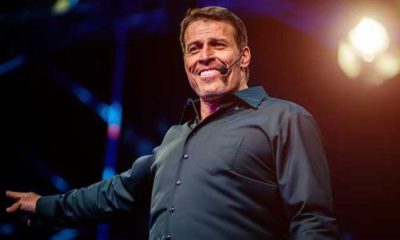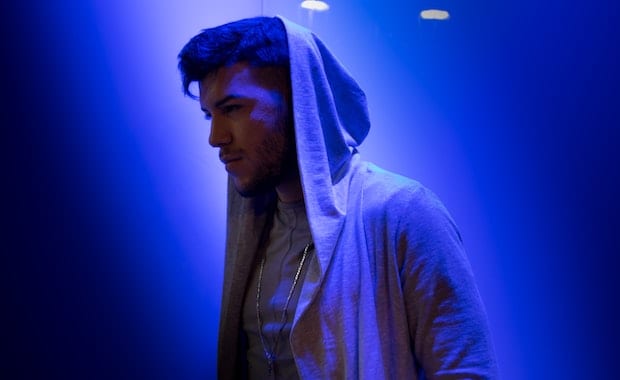Success Advice
10 Ways To Become A Millionaire Coach – Scott Harris

Many of us who are interested in the personal development industry and are entrepreneurial minded, have thought about being a coach. With this in mind, I interviewed Scott Harris, who is a millionaire coach himself and delivers Tony Robbins business mastery courses all over the world.
During the interview, I asked Scott what was one of the things that enabled him to achieve so much success, and his response was “look to be not ordinary, look to be extraordinary!” Seek out extraordinary people and find a way to hang out with them. You can do that through books, seminars and researching them online.
Seek to not be ordinary because there are enough ordinary people
Seek to be extraordinary in your finances and be able to live comfortably
Seek to be extraordinary in your relationships (peer group, partner, siblings)
Seek to be extraordinary in the example you set for other people
Seek to be extraordinary in the difference in your community
Scott started his company Ultimate Coach because there are not a lot of places out there that will hold coaches to a high standard and who can train coaches to be at the elite level.
From Richard Branson to Warren Buffet, to Tony Robbins, to Donald Trump, all of these high achievers share one thing in common; they all think coaching is very important. It’s optional to be successful, but if you want to be successful then having coaching and mentoring is not optional.
***The Tony Robbins Connection***
One thing I was keen to understand was how Scott came across Tony Robbins and became involved with his business. He said it all started when his mum stumbled across this thing called personal development and began traveling the world to attend Tony’s seminars, and then returning excited, motivated, using weird language and hugging everyone.
At the age of twenty-five, after seeing his mum change from the seminars, he decided that there was more to life than his luxury house, nice car, good job and successful business (at this time it was the mid ninety’s and Tony was still wearing the dorky suit and had bad hair).
The most dangerous thing that can happen to somebody in their life is that they can get some success, which makes them think they know everything. For the next twelve months Scott attended eighteen of Tony’s seminars – this started his transformation.
At the time, he didn’t know what his life purpose was going to be but he was very clear on what his life purpose was not. – that’s equally as powerful. Scott says, “never do anything ever again that you don’t love, that doesn’t make your heart sink, even if you are really good at it, and it makes you lots of money.”
About twelve years ago Scott was at one of Tony’s seminars as a helper and trainer when he had a knock on his door one night from one of Tony’s team. They asked Scott if he could fill in for a few hours at 9 am the next day.
Before accepting, Scott was very conscious that the point of going to a personal development event is that it’s called personal development for a reason. With this in mind he agreed, and they handed him a big binder with 300 pages of content to learn.
Luckily for Scott, he was already using Tony’s work in his life and was comfortable in teaching people how to use the skills Tony teaches. The relationship has grown over the years and now Tony is one of Scott’s closest friends, and they even speak on Christmas Day.
Below are the ten ways to become a millionaire coach just like Scott.
1. Start with personal congruency
The foundation of being a great coach is having personal congruency. Personal congruency refers to a state in which a person’s values and beliefs are consistent with the way he or she lives their life. So many people in personal development are not congruent.
This is not to be confused with perfection. It’s not about being a millionaire, having 10% body fat, owning twenty properties or having the perfect marriage, but you certainly want to be moving in the direction that makes you proud of who you are.
2. Pick up some skills and tools (don’t worry about certificates)
The next step to be a coach is to go and get some skills and tools – these are simple to get. You don’t have to have any formal training to be a coach, and Scott says anybody who thinks you do is an idiot.
The reason is that you can pay for a certification, and then you’re done; that does not mean that you can coach. Formal training to be a coach is not necessarily a bad thing to have, but right now the coaching industry worldwide is an unregulated industry, and any of the formal certifications are actually just internally certified.
It’s kind of like “join our gang and we will certify you.” The proof is that Scott is making a multiple seven-figure income, and he doesn’t have it, and Tony is making a very significant nine-figure income and he doesn’t have it either. Most of the great coaches Scott knows don’t have a certification either.
This is not to say you can’t learn skills and tools from institutions because you can. What you really need though is personal congruency, some skills and tools, and an ability to market and present yourself well to your ideal client, to be able to attract, keep, and service your ideal client.
3. Work out how much you can charge
In the beginning, you want to make sure that what you are getting out of the coaching experience is what you need to have – that may not be money. When Scott started twenty years ago he was only getting paid $21 a session.
He was doing 50-60 sessions a week, which was much more valuable to him than the $1000 he was getting. By doing this many sessions, Scott was getting scar tissue, muscle memory, and experiences and references that you can’t get from having five clients a week.
So how much to charge depends on what it is that you want out of the experience. There is no point charging someone $3000 an hour if that means you are only going to have two clients a week. It’s better to have fifty clients paying you fifty dollars than five clients paying you $500. In that first 6-12 months, you want to get references and experiences.
“ Charging is like skiing, if you go skiing for a week and not once do you crash and burn, then you have probably skied too easily. If you ski, and every single day you nearly have a crash and die, then you are probably skiing too hard. The goal of going skiing for a week is to find that sweet spot where you ski comfortably and have a great time, and then occasionally you push yourself so hard that it gets a little hairy. It’s kind of the same as charging, you want to charge not so much that you scare people away, but enough that just a few people are scared away. It’s a bit of a dance, and your fees should always change. “
4. Collect money efficiently and always use contracts
The way you collect money from your clients is crucial. The best way is to decide how many months of coaching the client needs (let’s pretend they need six months) and then get the payment up front. The key is always to get the money before you deliver the coaching and to always offer a 100% money-back guarantee – this ensures that you stand by the results you have promised.
If you can’t get the money up front for 3-6 months of coaching, then give people three options to pay you in advance of a session or group of sessions (never offer payment plans). As well as payments you need to also offer a contract to your client otherwise there are no rules to the game (not good).
The contract needs to have the rules of the game, their expectations, and your obligations. Before playing the game of coaching with a client, it’s good to talk about the rules before you begin coaching.
The worst thing that can happen is either their expectations are above and beyond or underneath of what it is that was set. Think of the contract like this with your client; here are the rules of the game, here are the consequences of the game, here are the results of the game, if you want to play the game, here is the fee to play the game.
If they agree with this then great, play the game, but if anything was confusing then start again. Once the rules are agreed between both of you, then you are finally ready to play the game!
5. Decide on how much of your time you want to coach
Most people that come to coaching come part time because they are in transition and have come from doing something else, and secondly they come with commitments to other people. Generally there is an uncomfortable phase of transition because you have two plates spinning, your job / business that is no longer serving your needs, and your desire to become a coach.
At the start, it can be a choice if you go part time or full time.
6. Choose life coaching or business coaching
The typical person that is suited to business coaching has a strong corporate background of 10-15 years, from a top tier company, and has earned a $400-500k salary each year. Somebody who is a regular person, who has had a regular life, is probably not qualified to be a business, coach.
This doesn’t mean you couldn’t learn the skills and tools, but that becomes an apprenticeship.
7. Work out a coaching session structure
The first part of your structure should be the length of coaching. Ideally, no one should be coached for less than 6 months if they want lasting results. The start of coaching someone is the messy bit, where you are finding out who the person is, what makes them tick, and how they got to be where they are.
The next step is to find out where they would like to be next which the client should always decide. In the first 3-6 sessions, it can easily look like you haven’t got anywhere, but what you are really doing is unpacking the box
The middle section of coaching someone is where you are getting clarity on where they want to go to, the quickest ways to get there, and then doing some research on all of this. A typical goal might be that they want to lose 10kg, run a marathon, fix their marriage, make $500k or whatever it happens to be.
The last part of the coaching is a bit like a rocket ship in the sky, all the hard work has been done in the beginning, and the back end is the cruisy bit. It’s about keeping them on track, monitoring, and measuring, and helping them get back on track if they have lost their way.
Some of these later sessions may only last 15-20 minutes because the client might be sophisticated, mature and committed, and they are 6-12 months into their coaching journey. Expect early coaching sessions to last for around 60-75 minutes because you are working out how they got to where they are, and what they really want.
Once you’re passed the early stage of coaching a typical session should last around 30-40 minutes. The frequency of sessions is the other part to determine. Having sessions every week is too much, and then on the other extreme anymore than 10 days apart is not frequent enough.
The other combination that works for session frequency is once a week for three weeks and then one week off. During the week off you might want to include some texts or emails to check in with your client.
8. Go and shake some people’s hands (marketing)
If you want to become a coach, which for most people is a very comfortable six figure income, this is not created from Facebook advertising, or a great website, it’s created in the beginning from relationships. Quite simply, relationships are built from shaking people’s hands.
When you are new to coaching, you are being employed by a client because of your personal congruency and relationship with them. When you meet someone at a function, and they ask what do you do, you tell them “I help people just like you, get the best results out of their life.” Their response will usually be “how do you do that?”
From here a conversation starts. Your first $100k, which is your first 5-15 clients, is absolutely coming from the hands that you are shaking and don’t tell yourself you don’t know anyone!
Every single day in your country, somewhere, there is a rotary club meeting, free seminar, conference, business club meeting, bank-sponsored dinner, and political party function – there is always somebody meeting somewhere every day!
You need to go to those places and meet people, shake their hand with congruency, and create relationships with them. That’s how you make your first $100-200k, not from Facebook or ads. From here, you then need to find the right hands to be shaking, for the types of people you want to coach.
It’s like fishing; if you want to catch salmon, you go to where the salmon are hanging out. You need to work out the types of clients you want to coach, and then you go to where they are hanging out. As an example, if you want to coach stressed out mums, then you go to a creche.
Before you have a brand, and before your brand has credibility, all you really have is your own personal congruency and your own personal ability to convince someone that you are going to add value to their lives. That comes from meeting them face-to-face and having a conversation. This doesn’t mean your coaching has to be face to face, and for Scott, none of his coaching is face-to-face.
9. Show your client the results
Coaching is about the client setting the standard for what they want to follow and then the coach helping them to hold themselves accountable to that standard. The outcomes have a two-fold result; one is tangible, such as how much money did you make, how many times did you take your wife out, how many kilograms did you lose, etc.
The second is the intangible element to the results, like does your client feel better because they are on track, even though the result –such as losing ten kilograms – hasn’t yet manifested? If the client emotionally feels better, then that’s an intangible result that should be measured.
To uncover the intangible results you need to ask questions about how they are feeling and make sure you check in with them like that regularly. Sometimes people can be moving forward but unless they are checking in, they don’t know they are on track.
Once you have produced the results then you obviously should ask your client for referrals (goes without saying).
10. Public speaking will evolve your business further
As your coaching business evolves you can start to reach more people by doing group coaching, online webinars, mentoring and public speaking. The most powerful of these is public speaking, which requires you to be able to speak on camera and on stage.
When I asked Scott what the first step was to public speaking, he gave me this great analogy:
“Practice doesn’t make perfect it makes permanent. What makes perfect is perfect practice. Going out and buying golf clubs, and then going to a golf course, is the most stupid thing someone can do. Unless you have some lessons first, you could be perfecting for six months how to swing the club badly every time – this is not a good outcome and will ensure you give up.”
Once you have the skills, then go practice at Toastmasters, speak at scout halls or church clubs; anywhere that you can get practice and just talk. If you don’t have the skills first, it’s like planting a lemon tree in the ground that’s growing crooked; it’s a lot harder to straighten it up when its grown crooked first.
As you think about your speech, focus on questions like what does the audience need, who are these people, what are their wounds, what are their hopes, what are their fears, what have they come to get, and how do I put my own certainties / doubts aside and show up in a way that serves them?
To be successful at public speaking, you will need to know your content, stories, audience and your outcome. If you know these things, then the path that you use on stage doesn’t need to be a predetermined thing.
You need to have confidence in your skills, tools, and experience and have confidence in your ability to reach deep into your well of stories, metaphors, content, examples, and references. If you have prepared all of these things, then your performance on stage will unfold naturally, and you will be able to adapt to the audience’s needs in real-time.
The final part of public speaking to consider is that you will need to follow a recipe just like a book. There needs to be an opening, some chapters, a few segways, the final penultimate scene, and then a wrap-up. Once you have mastered the recipe, it’s the same formula whether it’s a two-hour talk or a full day talk.
***Final Thought***
The difference between high achievers and ordinary people is a hunger, a thirst, and a quest to be successful or to have knowledge. The hunger is something you either have, or you don’t, but you can cultivate it. Just because you have a lot of money, it does not mean you are successful.
There are millionaires who are fat, and nobody likes them, and they are not successful. Scott says to read a lot and ignore most of the people in your life (parents, teachers, what’s in the paper and TV).
“You can make a million dollars and still be a jerk”
Focus on your health and eat quality food because there are two groups of people; people that die at sixty and people that die at 100. The average is 80, but there are really two groups. Decide which group you want to be in.
“Live deliberately, live on purpose and live like it matters”
If you read this article and have decided to take the next step in becoming a millionaire coach, then sign up for Scott’s Ultimate Coach Course here.
Business
If Your Business Internet Keeps Letting You Down, Read This
From smoother operations to better security, dedicated internet access is quietly powering today’s high-performing businesses.

Today, a dependable internet service is the bedrock for uninterrupted business operations. Many organizations rely on stable online connections for communication, data transfer, and customer interaction. (more…)
Did You Know
How Skilled Migrants Are Building Successful Careers After Moving Countries
Behind every successful skilled migrant career is a mix of resilience, strategy, and navigating systems built for locals.

Moving to a new country for work is exciting, but it can also be unnerving. Skilled migrants leave behind familiar systems, networks, and support to pursue better job opportunities and a better future for their families. (more…)
Life
10 Research-Backed Steps to Create Real Change This New Year
This New Year could finally be the one where you break old patterns and create real, lasting change.

Every New Year, we make plans and set goals, but often repeat old patterns. (more…)
Change Your Mindset
The Silent Skill That Makes People Respect You Instantly
What truly earns respect and why most people go about it the wrong way

Everybody craves respect but not everyone earns it. Some people believe that a title, years of experience, or a position of authority automatically entitles them to respect. (more…)
-

 Did You Know3 weeks ago
Did You Know3 weeks agoHow Skilled Migrants Are Building Successful Careers After Moving Countries
-

 Tech4 weeks ago
Tech4 weeks agoWhat’s in a Name? How to Get Your Domain Right
-

 Health & Fitness20 hours ago
Health & Fitness20 hours agoWhat Minimalism Actually Means for Your Wellness Choices
-

 Business4 hours ago
Business4 hours agoIf Your Business Internet Keeps Letting You Down, Read This






















7 Comments